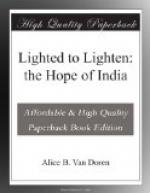December 15, 1921.
More than a month has passed since I began the Journal and I am now sitting in the junior B.A. class-room watching over nineteen students (the twentieth happens to be absent) who are writing their terminal examination papers. I was a false weather-prophet; rain did not come, and still keeps away. Instead there is a high cool wind, and every one of these students is firmly holding down her paper with the left hand while her fountain pen (they all have fountain pens) skims all too rapidly over the page. The great principle of answering an examination paper is never to waste a moment on thought. If you do not know what to say next, repeat what you said before until a new idea strikes you. As it is not necessary to dip the pen in ink it should never leave the page. This method enables them to produce small pamphlets which they hand in with a happy sense of achievement, but the examiner’s heart sinks as she gathers up the volumes of hasty manuscript.
Sometimes, however, the answers err on the side of conciseness. “We believe them because we cannot prove them,” was the truthful reply of a student in Physics to the question, “Why do we believe Newton’s Laws of Motion?” Or sometimes an essential transition is omitted; “At the period of the Roman conquest the Greeks were politically hopeless, economically bankrupt, and morally corrupt. They became teachers.” But sometimes it is the caprice of the English language which betrays them. “The events of the 15th century which most affected philosophic thought were the founding of America and the founding of the Universe.” Occasionally they administer an unconscious rebuke. I was just starting out to give an address at a week-night evening service from the chancel steps of a neighboring church, and having a minute or two to spare I took up one of my 120 Scripture papers and read, “St. Paul’s chief difficulty with the Corinthians was that women insisted on speaking in church. It is wicked for women to talk in church.”
The nineteen students before me are very representative of our student body, which now numbers one hundred and thirty. Eleven are writing on Constitutional History, two on Philosophy, four on Zoology and two (a young Hindu married girl and a Syrian Christian) on Malayalam literature. Ten of them speak Tamil, eight Malayalam, and one Telugu. They vary in rank from high official circles to very low origins, but most belong to what we should call the professional classes. All are barefooted and wear the Indian dress, which in the case of the Syrians is always white.




